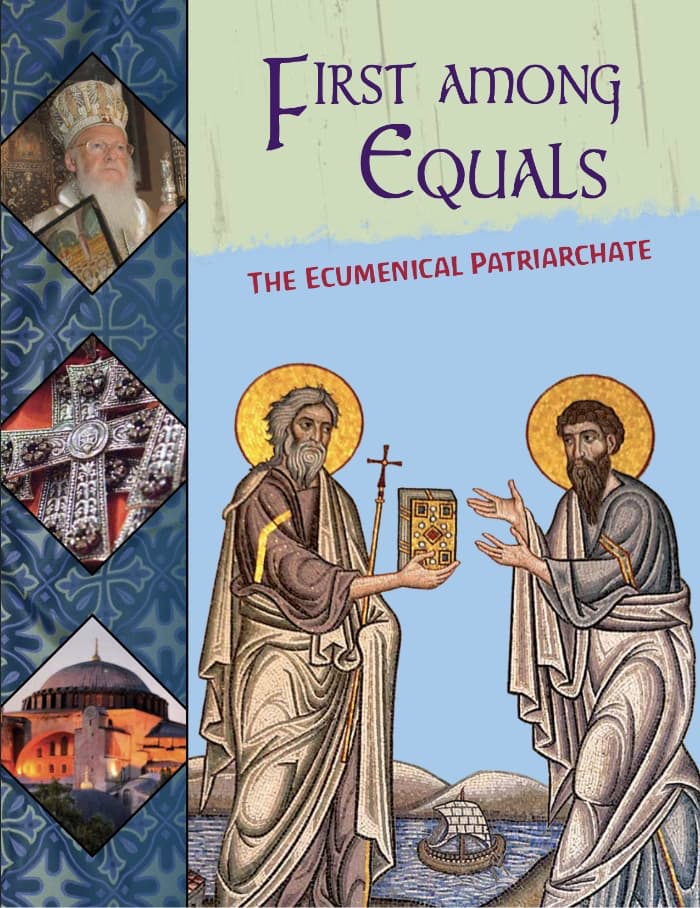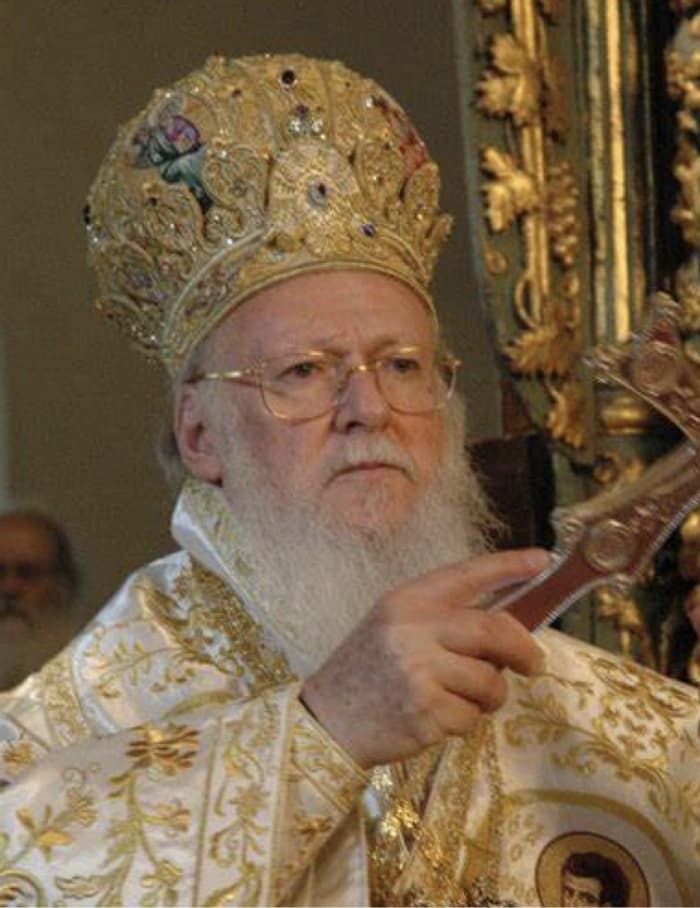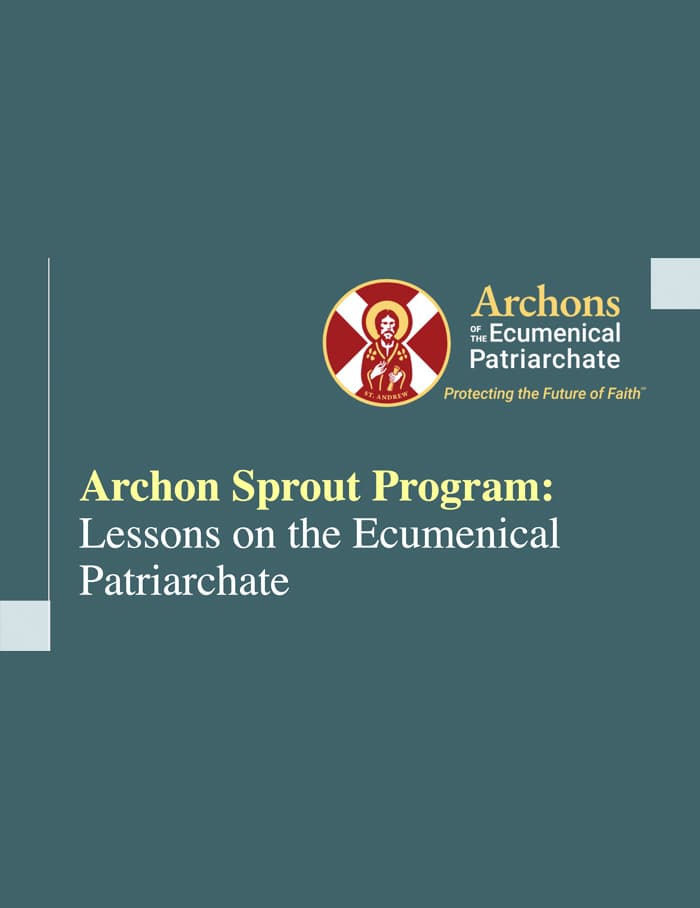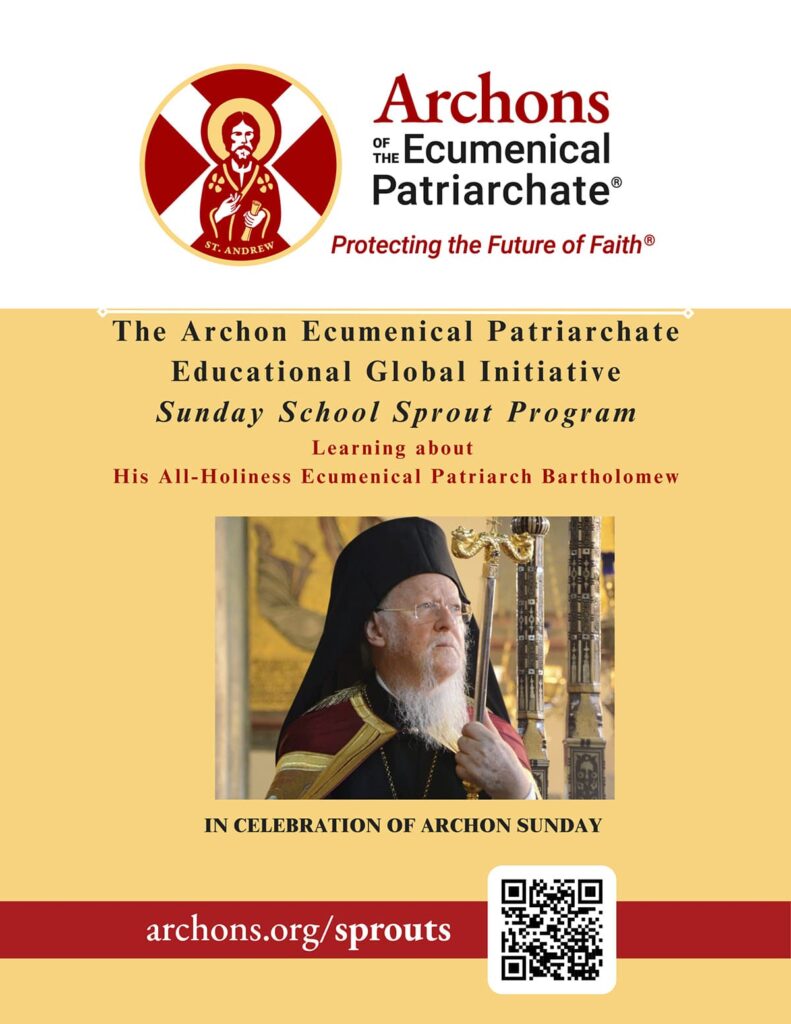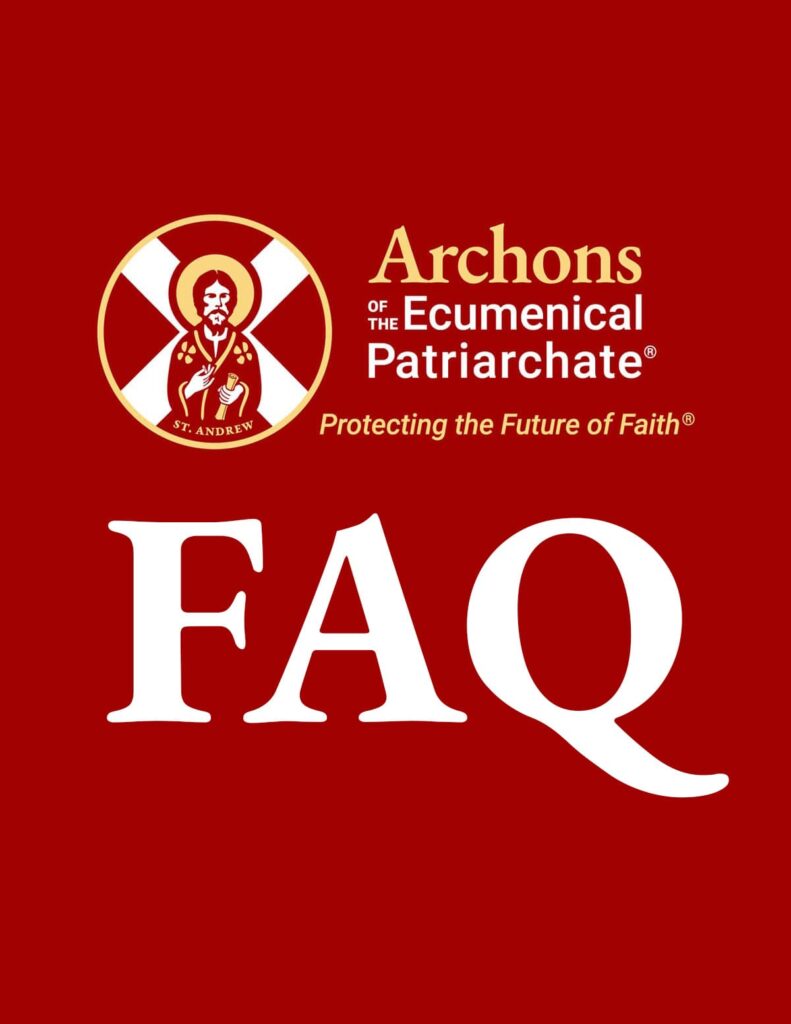Home » Global Educational Initiative
Sprout
Lessons
A Teacher Guide, Brought to you by the Archon Ecumenical Patriarchate Global Educational Initiative
Orthodox students can play a significant role in realizing a better future for our Orthodox church through their faith, their works, and their commitment to learning about and taking an active role in the mission and vision of the Ecumenical Patriarchate.
The Archon Ecumenical Patriarchate Global Educational Initiative is designed to provide students with an introduction to the Ecumenical Patriarch and the Patriarchate in an engaging and creative way. Our Sunday School educators serve as our partners to carry this work forward through our Sprout Lessons!
Students will learn about the factors that shape their Orthodox identity and develop an appreciation for the ways in which our Ecumenical Patriarch and other Orthodox leaders work tirelessly to inspire, lead, and defend the Orthodox faith around the world.
- Committee Members
- Archon Regional Commanders Nicholas J. Tranto and Nicholas E. Terezis
- Archon Soterios "Ted" Argeroplos
- Helen Nixon, Ed.D.
- Katina Limberakis Tsatalis, M.Ed.
We wish to recognize the generosity of Archon Michael and Robin Psaros for funding this initiative.
Lessons
All Grade Levels
Lesson Plan by Grade Level
Objectives:
1
Students will be able to identify and name His All Holiness Ecumenical Patriarch Bartholomew after viewing his picture.
2
Students will be able to recognize the Byzantine yellow and black double eagle flag and Patriarchal Seal.
Objectives:
1
Students will be able to identify Ecumenical Patriarch Bartholomew by his photograph and explain that he is the ‘First Among Equals’ of Orthodox Patriarchs.
2
Students will be able to identify Ecumenical Patriarch Bartholomew by his vestments and their meaning.
Objectives:
1
Students will be able to understand and explain the purpose, structure and governance of the Ecumenical Patriarchate.
2
Students will be able to understand and explain the purpose of Ecumenical Councils as a means to define and clarify the teachings of the Orthodox Church.
Objectives:
1
Students will be able to identify the Ecumenical Patriarch.
2
Students will conduct a Web Quest and spend time reviewing the Archon Website.
3
Students will identify key components and historical and political events that impact the Patriarchate.
Objectives:
1
Students will watch the 60 Minutes Interview with Patriarch Bartholomew and complete a capture sheet that is aligned with the content presented in the interview.
2
Students will participate in active discussion on what they have learned and how a “Call to Action” can encourage their participation and activism in Orthodox issues.
Teacher Resources
Staff Training
Powerpoint File
Teacher Training
Watch Video
FAQ
Frequently Asked Questions
Glossary
The leading church officer, and all bishops have the same sacramental position in guiding the people of God. He may be called archbishop or metropolitan, the latter simply meaning the bishop of a chief city, or a metropolis.
An archon is a servant leader in the Orthodox church. An archon is an honored titled given by the Ecumenical Patriarch to an Orthodox Christian community leader. They are committed to preserving the Orthodox faith and religious freedom.
An ecumenical council, also called general council, is a meeting of bishops and other church authorities to consider and rule on questions of Christian doctrine, administration, discipline, and other matters in which those entitled to vote are convoked from the whole world (oikoumene) and which secures the approbation of the whole Church.
The Ecumenical Patriarch has the historical, canonical, and theological responsibility to initiate and coordinate actions among all Orthodox Churches, whether under his jurisdiction, independent or autonomous. This includes assembling and convening councils, facilitating inter-Church and inter-faith dialogue, and addressing the issues of the day.
Faith is a means by which believers come to God and put their trust in Him for salvation. Learn More
According to the Bible, faith is the conviction of things not seen, the assurance of things hoped for. Learn More
The Dictionary of Bible Themes defines faith as a constant outlook of trust towards God, whereby human beings abandon all reliance on their own efforts and put their full confidence in him, his word, and his promises. Learn More
The purpose of Orthodox Christianity is the salvation of every human person, uniting us to Christ in the Church, transforming us in holiness, and giving us eternal life. This is the Gospel, the good news, that Jesus is the Messiah, that He rose from the dead, and that we can be saved as a result.
Historically, the Orthodox Church is the oldest of all Christian churches. Ultimately, all Christian communities can trace their own history back to the Orthodox Church. In the pages of the New Testament, we read the beginnings of the Orthodox Church, and even today Orthodox Christianity continues to live on in most of the places mentioned in the New Testament where the Apostles first preached the Gospel. This is the Church that wrote, compiled, and canonized the Holy Scriptures, which formulated the traditional doctrines of Christianity, and that has believed and lived the same faith for 2,000 years.
Today, Orthodox Christianity’s largest communities exist primarily in Eastern Europe and the Middle East, though there are also sizable communities in North America, Western Europe, Africa, Asia, and Australia, primarily through immigration in the 19th and 20th centuries, but also through a growing number of converts to the faith. It is the second largest Christian communion in the world, smaller only than the Roman Catholic Church. The Orthodox Church is sometimes referred to as “Greek Orthodox” or “Eastern Orthodox,” but the best term is simply Orthodox Christian.
Is a neighborhood midway up the Golden Horn, within the borough of Fatih, in Istanbul, Turkey (formerly Constantinople). The streets in the area are full of historic wooden houses, churches, and synagogues dating from Byzantine and Ottoman times. The name phanar comes from Greek "fanari" (φανάρι), meaning lantern. After the fall of Constantinople on May 29, 1453, the Phanar district became the home to most of the Greeks who remained in the city.
Religious freedom refers to the right of individuals or communities, both in public and private settings, to manifest their religion or belief through teaching, practice, worship, and observance. It encompasses the ability to live, speak, and act according to one’s religious convictions without interference from the government or external authorities.
In Christian belief, a saint is a person who is recognized as having an exceptional degree of holiness, likeness, or closeness to God.
